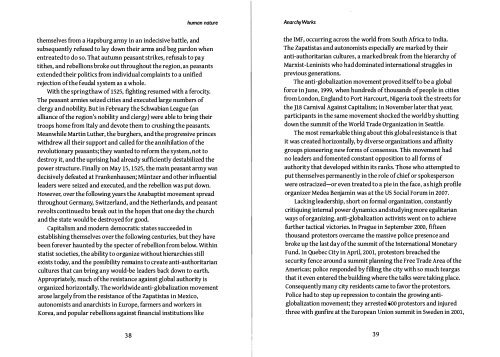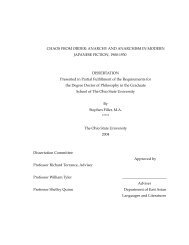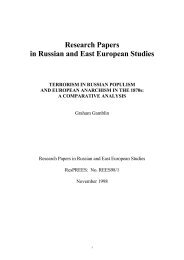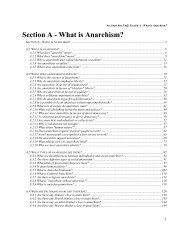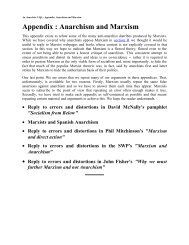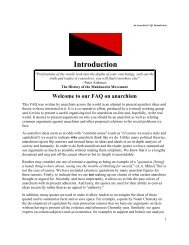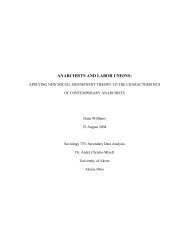Anarchy Works.pdf - Infoshop.org
Anarchy Works.pdf - Infoshop.org
Anarchy Works.pdf - Infoshop.org
Create successful ePaper yourself
Turn your PDF publications into a flip-book with our unique Google optimized e-Paper software.
human nature<br />
<strong>Anarchy</strong> <strong>Works</strong><br />
themselves from a Hapsburg army in an indecisive battle, and<br />
subsequently refused to lay down their arms and beg pardon when<br />
entreated to do so. That autumn peasant strikes, refusals to pay<br />
tithes, and rebellions broke out throughout the region, as peasants<br />
extended their politics from individual complaints to a unified<br />
rejection of the feudal system as a whole.<br />
With the spring thaw of 1525, fighting resumed with a ferocity.<br />
The peasant armies seized cities and executed large numbers of<br />
clergy and nobility. But in February the Schwabian League (an<br />
alliance of the region's nobility and clergy) were able to bring their<br />
troops home from Italy and devote them to crushing the peasants.<br />
Meanwhile Martin Luther, the burghers, and the progressive princes<br />
withdrew all their support and called for the annihilation of the<br />
revolutionary peasants; they wanted to reform the system, not to<br />
destroy it, and the uprising had already sufficiently destabilized the<br />
power structure. Finally on May 15, 1525, the main peasant army was<br />
deciSively defeated at Frankenhausen; Miintzer and other infiuential<br />
leaders were seized and executed, and the rebellion was put down.<br />
However, over the following years the Anabaptist movement spread<br />
throughout Germany, Switzerland, and the Netherlands, and peasant<br />
revolts continued to break out in the hopes that one day the church<br />
and the state would be destroyed for good.<br />
capitalism and moderu democratic states succeeded in<br />
establishing themselves over the follOWing centuries, but they have<br />
been forever haunted by the specter of rebellion from below. Within<br />
statist societies, the ability to <strong>org</strong>anize without hierarchies still<br />
exists today, and the possibility remains to create anti-authoritarian<br />
cultures that can bring any would-be leaders back down to earth.<br />
Appropriately, much of the resistance against global authority is<br />
<strong>org</strong>anized horizontally. The worldwide anti-globalization movement<br />
arose largely from the resistance of the Zapatistas in Mexico,<br />
autonomists and anarchists in Europe, farmers and workers in<br />
Korea, and popular rebellions against financial institutions like<br />
the IMF, occurring across the world from South Africa to India.<br />
The Zapatistas and autonomists especially are marked by their<br />
anti-authoritarian cultures, a marked break from the hierarchy of<br />
Marxist-Leninists who had dominated international struggles in<br />
previous generations.<br />
The anti-globalization movement proved itself to be a global<br />
force in June, 1999, when hundreds of thousands of people in cities<br />
from London, England to Port Harcourt, Nigeria took the streets for<br />
the J18 Carnival Against Capitalism; in November later that year,<br />
participants in the same movement shocked the world by shutting<br />
down the summit of the World Trade Organization in Seattle.<br />
The most remarkable thing about this global resistance is that<br />
it was created horizontally, by diverse <strong>org</strong>anizations and affinity<br />
groups pioneering new forms of consensus. This movement had<br />
no leaders and fomented constant opposition to all forms of<br />
authority that developed within its ranks. Those who attempted to<br />
put themselves permanently in the role of chief or spokesperson<br />
were ostracized-or even treated to a pie in the face, as high profile<br />
<strong>org</strong>anizer Medea Benjamin was at the us Social Forum in 2007.<br />
Lacking leadership, short on formal <strong>org</strong>anization, constantly<br />
critiquing internal power dynamics and studying more egalitarian<br />
ways of <strong>org</strong>anizing, anti-globalization activists went on to achieve<br />
further tactical victories. In Prague in September 2000, fifteen<br />
thousand protestors overcame the massive police presence and<br />
broke up the last day of the summit of the International Monetary<br />
Fund. In Quebec City in April, 2001, protestors breached the<br />
security fence around a summit planning the Free Trade Area of the<br />
Americas; police responded by filling the city with so much teargas<br />
that it even entered the building where the talks were taking place.<br />
Consequently many city residents came to favor the protestors.<br />
Police had to step up repression to contain the growing antiglobalization<br />
movement; they arrested 600 protestors and injured<br />
three with gunfire at the European Union summit in Sweden in 2001,<br />
38<br />
39


